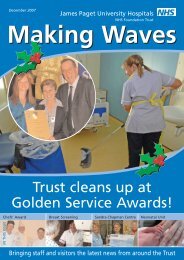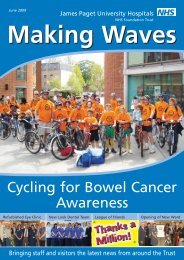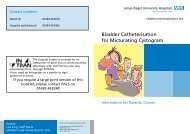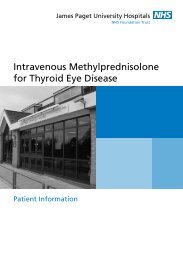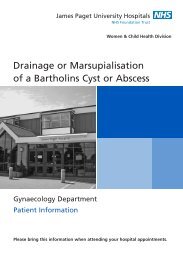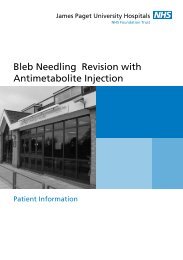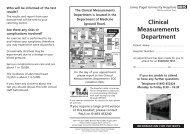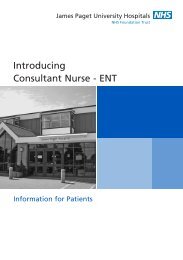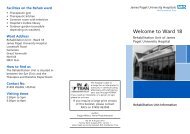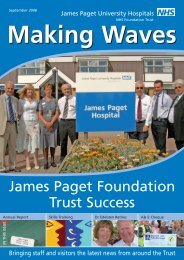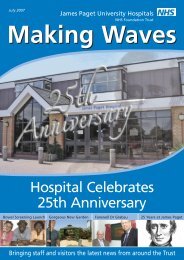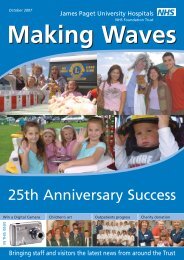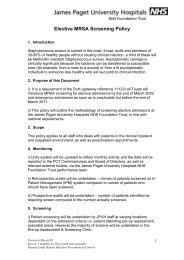Where you come first Where you come first - James Paget University ...
Where you come first Where you come first - James Paget University ...
Where you come first Where you come first - James Paget University ...
You also want an ePaper? Increase the reach of your titles
YUMPU automatically turns print PDFs into web optimized ePapers that Google loves.
News<br />
Obs and Gynae<br />
The Trust hosted a Royal College of Obstetricians and<br />
Gynaecologists Basic Practical Skills in Obstetrics and<br />
Gynaecology Course in early November.<br />
This was a successful event with very good feedback<br />
from the participating trainees who described the course<br />
as instructive, educational and fun.<br />
The course modules focused on the importance of<br />
sound anatomical knowledge, correct development of<br />
tissue planes, appropriate use of traction and countertraction,<br />
meticulous haemostasis and gentle tissue<br />
handling as well as practice of basic obstetric skills<br />
and gynaecological procedures (hysteroscopy and<br />
laparoscopy) under direct supervision.<br />
It is hoped that the course will be a valuable early<br />
step in building safe surgical and obstetric skills in our<br />
future generation of Obstetricians and Gynaecologists.<br />
The Trust aims to host two such courses per year, placing<br />
us amongst other UK centres of excellence in basic<br />
surgical training.<br />
In October, the JPUH hosted the Autumn meeting of<br />
the East Anglian Obstetrical and Gynaecological Society<br />
(EAOGS) at Zest, Potters Leisure Resort.<br />
All obstetricians and gynaecologists in the East<br />
Anglian region met with trainee doctors and midwives<br />
for a full day event of education. This included<br />
presentations by the Royal College of Obstetricians<br />
& Gynaecologists and eminent speakers from Trusts<br />
around the UK.<br />
This was one of the largest gatherings of EAOGS and<br />
is one of the most important conferences hosted by the<br />
Trust.<br />
Organ Donation<br />
There are currently more than 10,000 patients in need<br />
of organ transplants in the UK and sadly around 1000<br />
die each year before a suitable match can be found.<br />
Step in Samantha Major - specialist nurse in organ<br />
donation, who is based at the JPUH and employed by<br />
NHS Blood and Transplant.<br />
Samantha’s role is to work closely with staff on<br />
Intensive Care and in Accident and Emergency to<br />
support relatives of those patients in whom every<br />
effort has been made to save their lives but there is<br />
absolutely no hope of recovery, and to give them all the<br />
information they need to help them make a decision<br />
about organ donation.<br />
Samantha said: “Obviously it’s an incredibly<br />
harrowing time for patients relatives and the situation<br />
needs to be handled with sensitivity and compassion.<br />
We are not asking staff to approach the families<br />
themselves but to contact a specialist nurse in organ<br />
donation if they think a patient might be a suitable<br />
donor.” There is no age limit to organ donation and the<br />
only absolute medical contra-indication is CJD.<br />
Patients need to be on a ventilator before death for<br />
their organs to be suitable for transplant and the option<br />
of organ donation will not be offered to the family until<br />
it is clear that there is sadly no chance that their relative<br />
will get better.<br />
Samantha added: “When we work with the clinical<br />
staff in these situations we spend time talking to<br />
relatives, explaining what has happened and answering<br />
any questions that they may have. Our job is to give<br />
the relatives all the information they need to make a<br />
decision that is right for them, whatever that may be.”<br />
“We explain that one donor could change the lives<br />
of several people since the kidneys, heart, liver, pancreas<br />
and lungs could all potentially be used, as well as their<br />
corneas, skin, heart valves and bone.”<br />
“We never use persuasion or rush families into a<br />
decision. If they agreed to donation we do all we can<br />
to help them say goodbye to their loved ones, including<br />
making hand prints, taking locks of hair and making<br />
sure the patient is treated with dignity and respect at all<br />
times.”<br />
We do not carry out transplants here at the <strong>James</strong><br />
<strong>Paget</strong> so my role includes co-ordinating specialist<br />
surgical teams from Addenbrooke’s and Papworth who<br />
<strong>come</strong> and retrieve the organs, often at very short notice<br />
and at all hours of the day and night. “It can be very<br />
exhausting but it is also a great privilege, especially<br />
when <strong>you</strong> read the thank-<strong>you</strong> letters from the recipients<br />
and <strong>you</strong> realise that the organs that have been so<br />
generously donated have either saved lives or changed<br />
them beyond recognition. The gift’s that these patients<br />
and their families give at the end of their lives will never<br />
be forgotten and I am incredibly honoured to be a part<br />
of the process”.<br />
Samantha can be contacted at the<br />
Eastern Organ Donation Services<br />
Team office in Cambridge on<br />
0300 123 23 1106.<br />
To sign up to the NHS Organ<br />
Donor Register, call free 0300<br />
123 23 23 (24 hours), Text<br />
SAVE to 84118 or visit www.<br />
organdonation.nhs.uk<br />
Page 4 Making Waves Newsletter December 2011 www.jpaget.nhs.uk



